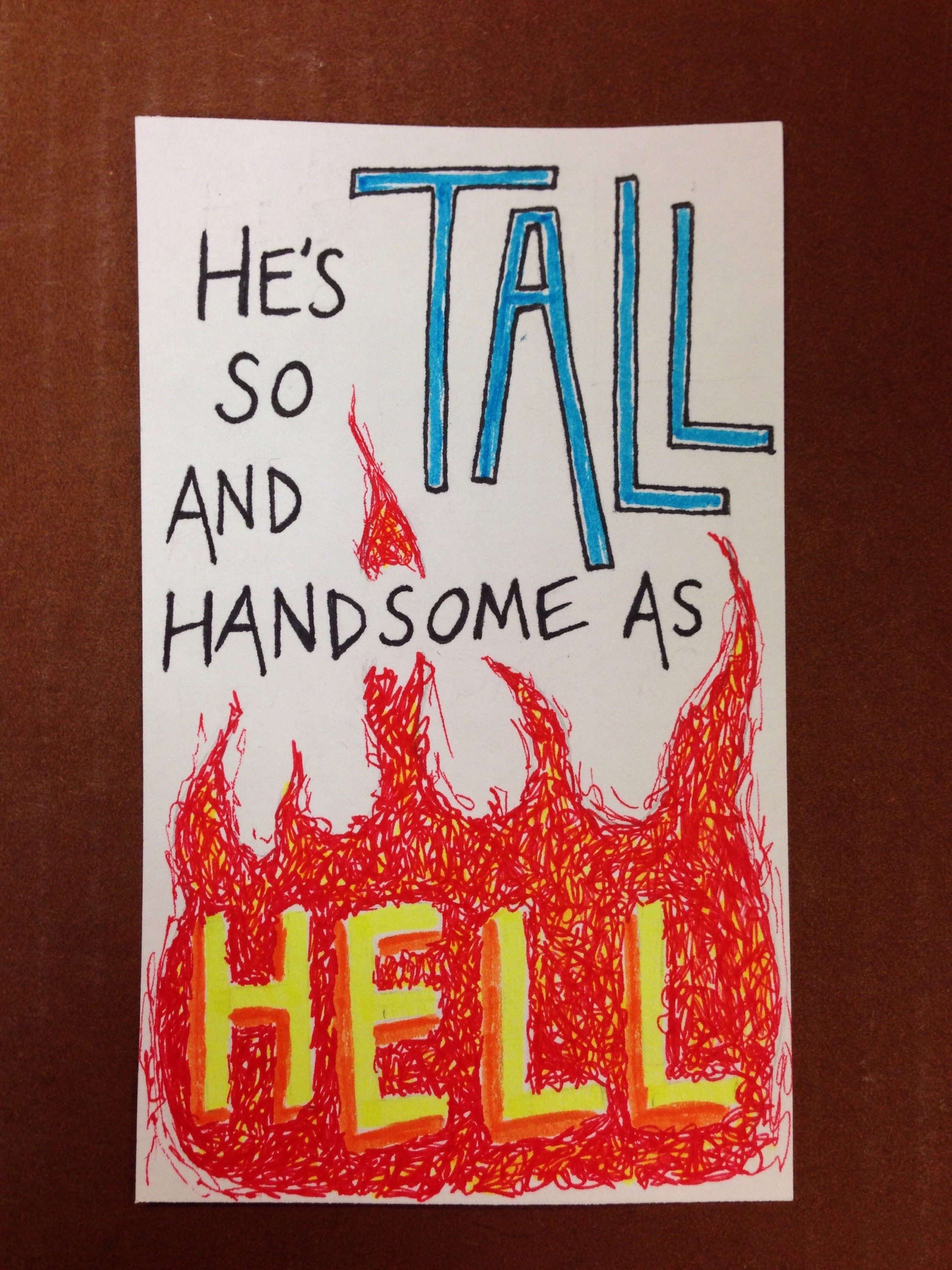Is this thing on?
Category: Uncategorized
Hey Dan!
1 Comment | PermalinkLibrary display
Category: Uncategorized
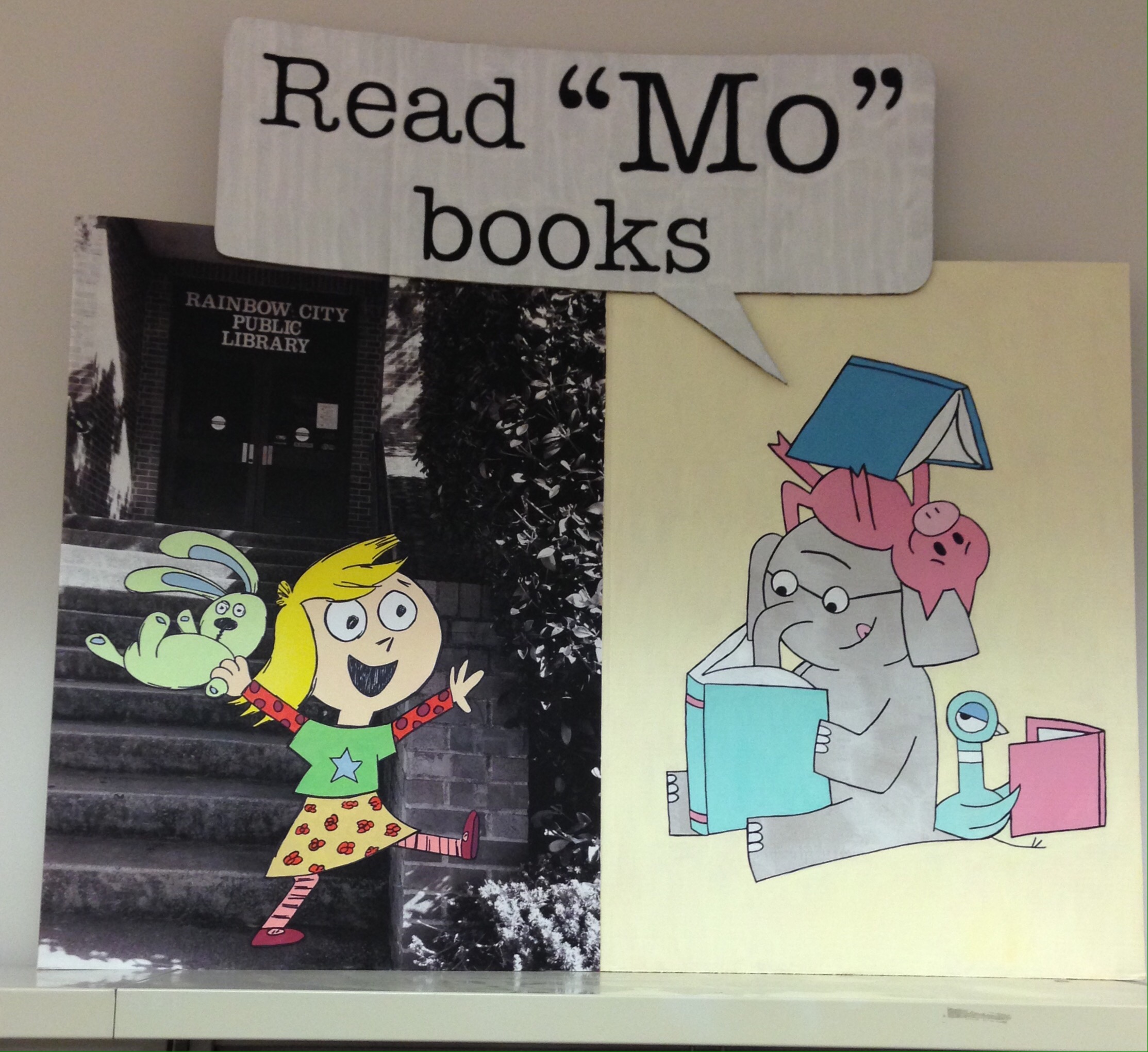 Finished this Mo Willems display for the library. Had a blast making it.
Finished this Mo Willems display for the library. Had a blast making it.
A play starring me
Category: Uncategorized
And now a play starring me:SCENE: interior of a car. A husband is driving. His beautiful wife is sitting in the passenger seat, and old, old folk song called Waterloo is playing on the radio. This is all the beautiful wife’s fault.
Mr. Fleegan: what is this song? Is this from the Civil War?
Me: no! C’mon, Waterloo? That’s Napoleon. Way before the Civil War. Like 1815 or whatnot.
Mr. Fleegan: but like, *close* to the Civil War.
Me: Do you mean France’s civil war?
Mr. Fleegan: who is Francis?
Me: I hate you so much.
Mr. Fleegan: You’re bad at math.
1 Comment | PermalinkWhat is job?
Category: dribblings

My coworker walked up to me and asked, “Hey Jaimie, are you busy?”
And I answered, “I’m working on my Art Night project drawing a dinosaur wearing a tutu riding a skateboard. I’m not sure how to answer your question.”
“Oh. Never mind.”
“No, I’m joking. Of course this can wait. What do you need?”
“You really are drawing a dinosaur wearing a tutu on a skateboard.”
“I know. You needed some help with something?”
“I can’t remember anymore.”
1 Comment | PermalinkTags: art, library, work stories
As an artist, I love reading about creativity and the process of other artists, so when journalist, local author, poet?, husband, father, Sunday school teacher, William Thornton (apparent Master of Time Management), was perusing the new releases at the library the other day, I asked him if I could interview him for fleegan.com cos, “it’s sort of a book blog sometimes.”
He was totally up for answering my questions. What a super-nice guy!
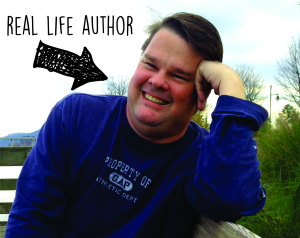
1. Do you have a certain room where you write? A wood-paneled study? A sparse, white-walled, clinical home office? A smoke-filled, gin-soaked basement? Or in this age of mobile devices and Google docs, do you camp out on the couch or at the kitchen table and pound out pages and pages while your family sits next to you asking you questions you don’t hear and remembering how awesome the kitchen table used to be before you puked a first draft all over it?
First thing – you can’t get mystical about the nuts and bolts of writing. It can happen anywhere. The first page of the first novel I ever attempted was written after midnight in the basement of Coleman Coliseum in Tuscaloosa, totally unplanned. Just had an idea and spit it out, with the realization that if I didn’t get it out at the moment, it might float away into the ether. I do tend to write in my work room, which has a bunch of books in it, at a desk, on my laptop. But I tend to approach different projects in different ways. I get an idea, sometimes characters, sometimes situations, and then begin to ask questions. Why would it be that way? Why would he/she do this? Then the story begins to take hold. Then I tend to do a screenwriter thing – I will carry around notecards or Post-It notes and sketch out ideas. Sometimes lines of dialogue and scenes will occur to me. Then the skeleton starts to develop. When I feel like I’ve got enough, I start writing. Sometimes I know roughly where I’m going. Sometimes I don’t. But when you take notes, write legibly. Because you may be months later wondering what that brilliant idea was that you just scrawled…
2. Do you set writing goals?
How many words per day?
How militant are you about your writing goals?
I try to plug out about 1,200 words a day when I’m working on a project. As long as I’m in that neighborhood, I’m OK. I try not to do too much, or too little. Once I wrote 10 pages in one day. I didn’t finish that particular project. But it doesn’t have to be at a particular time of day, as long as I get it done. Several years ago, when my Dad was very sick and dying, I started working on something to get my mind off things until the press of events made me abandon it temporarily. 20 minutes here, 10 minutes there. In about five weeks, I wrote about 50,000 words, which is about 150 pages. Still not sure how I did that. Not sleeping helps.
3. When you get stuck on a plot thing or a dialogue thing, what do you do to get unstuck? Do you step away for a bit? (Like, minutes, hours, years?) Do you work on a different part? Do you cry tears of bitterness all over your manuscript?
The pages get very soggy and the words hard to read if you cry. (Again – demystify.) Dialogue hasn’t held me up as much as plot. (You can always rewrite dialogue.) The book out now, “Set Your Fields on Fire,” took a long time in gestation, so to speak. I started writing it in the winter of 2009, but I got stuck on how the book would end. Now I was still relatively early in it, probably 10,000 words, but I didn’t want to go too far without having a clear cut idea of where it was going. Then a year later, I took it up again and got to the end of the first fourth of the book, but again I got hung up. Then I didn’t go anywhere near it until the beginning of 2014, when I decided to just go ahead and write it with that original ending, which is what I did. By waiting that long, though, I did get a few ideas that helped spice it up along the way.
4. Is music an influence at all in your work? Do you listen to music while you write? Do you ever hear a lyric and think, “Man, that’s good. How can I steal that?”
Which songs have you stolen from already?
(Also, when I say steal/stolen, I do not mean copy or plagiarize. I mean artistic license or inspiration or whatnot. I do not mean to insinuate that you would copy another person.)
Music is an inspiration. Can’t say I listen to music with lyrics too much when I write – I tend to focus on the words. The inspiration comes when I’m not writing but thinking about the plot. For example, it helps with working out kinks in scenes or action. My first novel was called “Brilliant Disguises,” and the inspiration came from the Bruce Springsteen song. I’m not the world’s greatest Springsteen fan, but there’s something about the lyrics of that song that have always killed me, and some of that broke into the book. And for that book, I also made a CD of pop songs by “secular” artists and groups that mentioned Jesus – stuff by Violent Femmes, The Velvet Underground, The Rolling Stones, Prince. I’d listen to that when I wasn’t writing. When I was working on a book about Hollywood, I would sometimes listen to The Eagles’ “Hotel California.” There was something about that song that conjured up this idea in my head of a rotten empire of dreams, and people trapped inside it.
5. If you had to engage in spirited fisticuffs with Hemingway, how would you rate your odds? Would you share a drink after and reflect on the regrets and the struggles of the white male? You may also substitute Mailer for Hemingway.
I went through a serious Hemingway phase where I had to read everything he wrote in about a year’s time. I devoured his work, but I don’t think he would have made a particularly friendly sort. In the end, it’s all about him. Anyway, Ernesto would drop me outside of 10 seconds, depending on how sober he was in the ring. I could take Mailer. No reach.
6. Assuming you’ve been turned down by publishers/magazines/
I have every rejection letter I have ever received, which may number about 400 by now. I keep them in a folder. I learned how much I hate rejection. Just so you know, most agents/publishers etc. are inundated with manuscripts, so once they pick the things up, they’re looking for excuses to reject you. You’re lucky if you get any feedback beyond a form. Now, most of them don’t even respond, which is evil, to be honest. But the few that did respond beyond the form were always encouraging. The message was usually, “This is good, just not for me.” So it made me think if I could just find “that person” for whom it would be for, I’d be OK.
7. As a novelist, what do you think of poetry?
I write poetry too. In college, I wrote bales of it. It teaches you how to use language. The combinations of sounds and words can move you. Juxtapose the right ones, and you can create an effect that may move someone in a different way than you intended. I am somewhat old fashioned when it comes to both poetry and prose – gimme story, structure, etc. I’m not interested in the sentiment you can create through words that don’t lead anywhere. You gotta tell me something or I’m gonna keep walking. I’m not interested in finding out how brilliant you think you are. I have a theory that Shakespeare knew he was awesome, deep down, but he was just trying to do a job. You have to keep perspective. Think about this – Jesus said, “Heaven and earth will pass away, but my words will never pass away.” That means Keats, Tolstoy, Shakespeare, Dickens, Chuck Berry, Dylan, Plath – you name it. We’re all also rans. So a lot of the heat is off. You can just be free to write.
8. As a journalist, your job is to report the facts. In what way are you able to be creative in reporting the facts? Or is creativity a non-factor/non-issue? If there is no creativity in it, how does that not become soul-crushing?
The only job that ever crushed my soul was working in the grocery store. Man, don’t bruise people’s kiwi fruit. They get vicious. Journalism tells people things they don’t necessarily know but might want to know. Part of your duty is to clarify why they should want to know it. Clarifying is telling them as many of the facts as you can, recreating as much of time, scene, statements, other factors as possible and learning what to discard. Sometimes what you leave out can color the truth of a story too. So you have to be creative to know how to organize all that. There is some journalism, like poetry or prose, that can be crafted in such a way that the reader is supposed to come away marveling at how brilliant a storyteller you are, but I get tired of that too. The story isn’t about the journalist. Most people don’t care who wrote a story anyway, be it fiction or non-fiction. You’ve got to be realistic about that.
9. As an author, are you able to enjoy reading? I know you read quite a bit, but do you ENJOY it? Do you find yourself analyzing everything or are you able to still get lost in a story?
Oh, man, I love reading. And you have to love reading to want to write. You have to be willing to relearn how to do things every single day. I love getting into a particular writer and learning his or her hangups, favorite words, phrases, motifs. Anne Rice loves to use the word “preternatural.” All John Updike novels have at least one use of a particular vulgarity which you can see him unsheathe like a sword somewhere around page 250. “Oh, here it comes!” You can analyze something and still enjoy it and get lost in it. I enjoy that when you can see the gears moving and still appreciate it for what’s going on. I find that happens a lot more for me with movies than books though.
10. When you write fiction, like, how? How do you do that? You have fake people doing things in your head, does it make you feel crazy sometimes?
What comes first, a character or plot?
Do you know how the story ends before you start writing it, or does the ending happen organically as you write the story?
Crazy, yeah. Absolutely. You’ll be driving down the road and you’re trying out lines of dialogue and you’re just talking to yourself. But now there are more people on the roads with Blue Tooth doing the same thing, so I don’t feel so bad. I’ve been doing this since I was a kid, too. The imagination is like a muscle. You work it out, and sometimes you have to be crazy to do it.
Plot or character can come first. As I said before, I have started stories not knowing exactly how they ended, but I usually want to know what general direction we’re headed in. The story can change though.
“Set Your Fields on Fire” started in October 2008 when I read a story in The Wall Street Journal about church consultants who get hired to evaluate congregations like people evaluate grocery stores and retail chains. I immediately thought of this as a comedy. I mean, I had the idea that very day. It was situation and character immediately. But it took a few months for me to figure out that the comedy would come because this guy would be a real stickler. My first idea was to have it be just about one person in a situation. But then I realized he needed a team. How would I organize it? That came when I was flipping through the TV and saw “Oceans 11.” Then I had a structure for the story – old character, young female, millennial guy, undercover person, voice of reason, adversary, etc.
11. Which Hogwarts house would you be sorted into? You may choose to sort 11 year-old you, now you, or both. And please, be honest. And no, you may not play the age card here. And if you really, really, really, don’t know, then I want you to ask your daughter into which house you’d be sorted.
I would probably be in Ravenclaw. I aspire to either Gryffindor or Slytherin, but I’ll probably just melt into the background. I would have a great name, like Balthasar Fahrenheit or something.
12. How connected are you to your work while you are working on it? Is it your “baby” (gag, by the way) or like, a piece of you?
Do you still feel as connected or connected at all after it has been completed?
When I’m working on something, it’s on my mind virtually all the time. That’s why you have to keep a notepad close by, because stuff can bubble up to the surface at any moment. I used to be much more superstitious about stuff when I was working on it. I probably won’t tell you about it until I’m finished with the first draft, for fear I’ll tell you everything and won’t feel the tickle to get it on the page. But I’ve written enough of these that I don’t feel so precious toward them. I mean, you can’t get too married to the work because you may have to cut it ruthlessly at some point to make it work. You can’t look at the page as something sacred. You wrote it. You can rewrite it. No matter how special it may be to you, if your intended audience doesn’t get it, then it’s worthless. Worthless.
13. Do you understand how brave you actually are for letting people, the public at large, read your work? Anyone can say anything about it. How do you sleep at night?
That’s not brave. That’s egotistical. To write something, you have to believe that it’s worth somebody else reading – someone who may never know you, meet you, understand you as a person, or even like you. What’s worse – nobody may like it. Or even worse than that – nobody may care. It would keep you awake at night to know how many people actually read books, or read books that you think they should read. On a related note, there are plenty of stories about writers who have long careers, but only one of their books, in essence, survives. And it may be the one book they just didn’t like so much of their work. If you go to William Faulkner’s house in Oxford, Miss., in one room there’s an outline for his novel “A Fable,” written on the actual wall of his work room. He spent years on it, but a lot of critics dismiss it and value other stuff over it. But once you turn the book loose, it belongs to the reader. Whatever you intended, it may mean something totally different to them, or nothing at all. So you better do it right.
Thank you so much, Bill, for taking time to answer my questions.
Guess what kids? Bill’s new book is out RIGHT NOW. It looks like this:
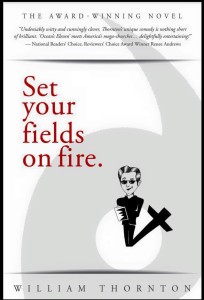 Go buy it here. It’s easy.
Go buy it here. It’s easy.
If you want to test drive it, you can read the first chapter of his new book, Set your fields on fire. at his website.
Tags: fiction, William Thornton
Sweets and Smalls
Category: Uncategorized
I haven’t updated in so long. The holidays were garbage. Work is crazy. I’ll post some book reviews soon, but first enjoy some cuteness. 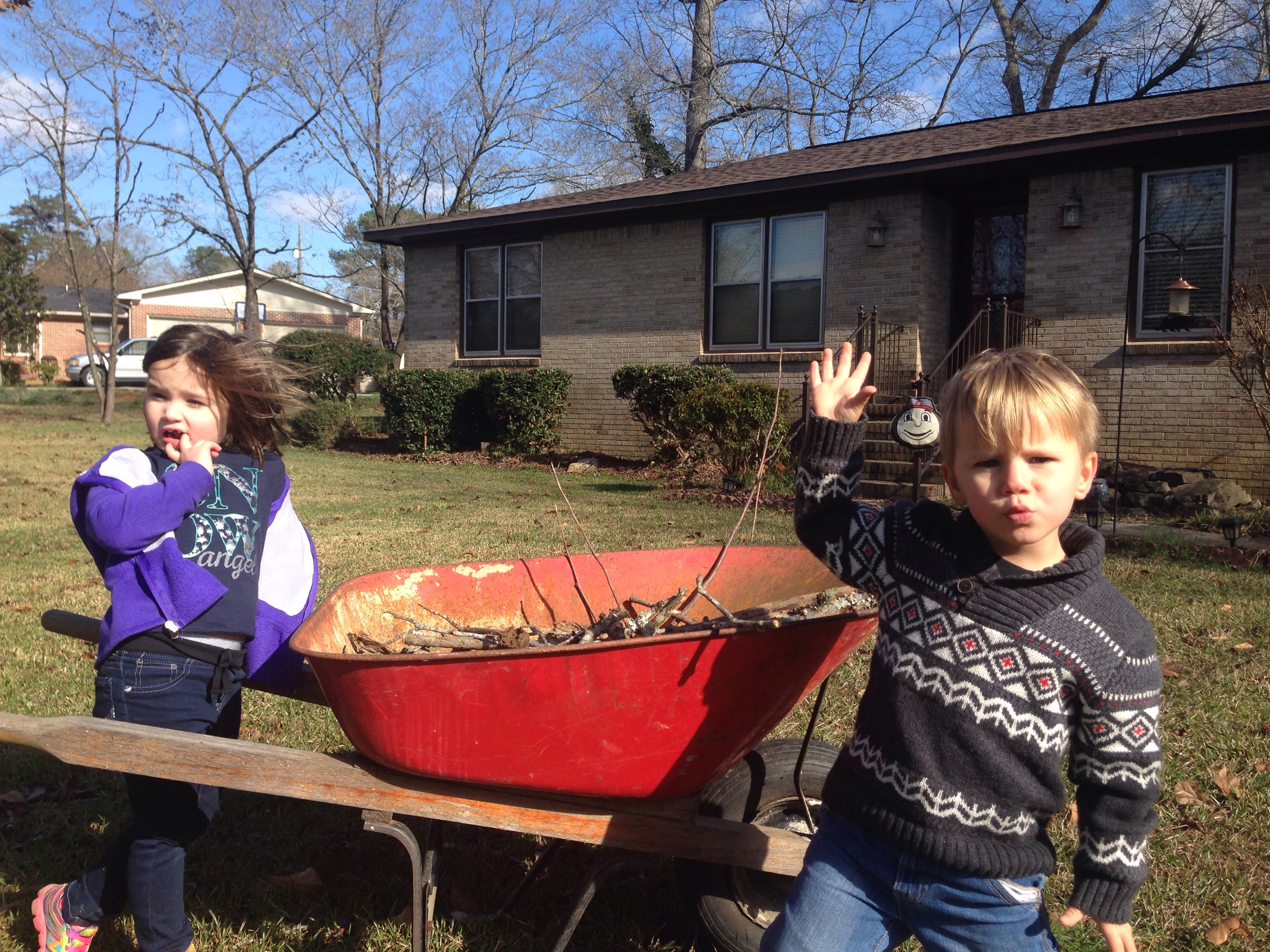
When Popsicle has to babysit the kids he puts them to work.
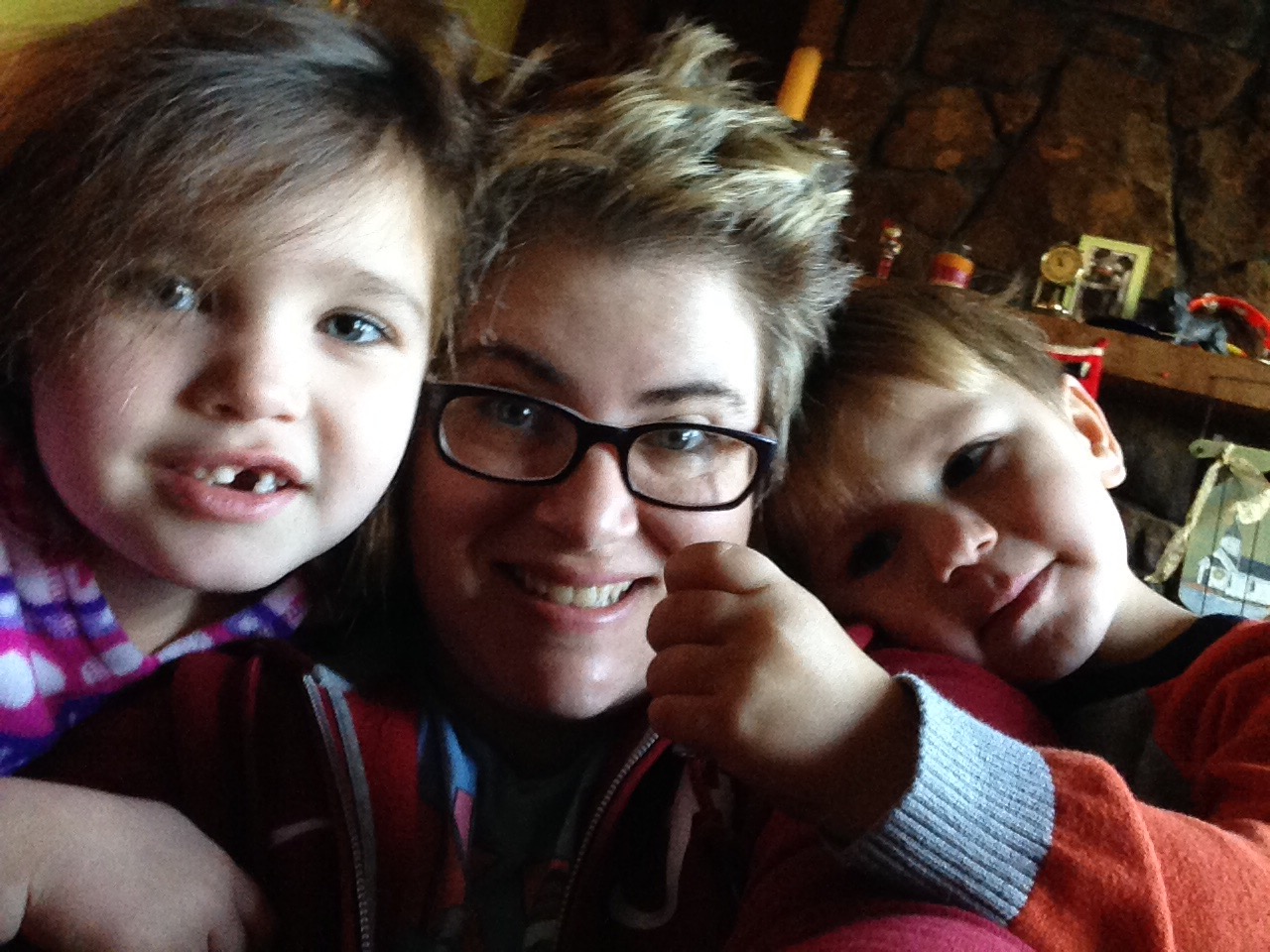
Sweets has lost 3 teeth in the last couple of months.
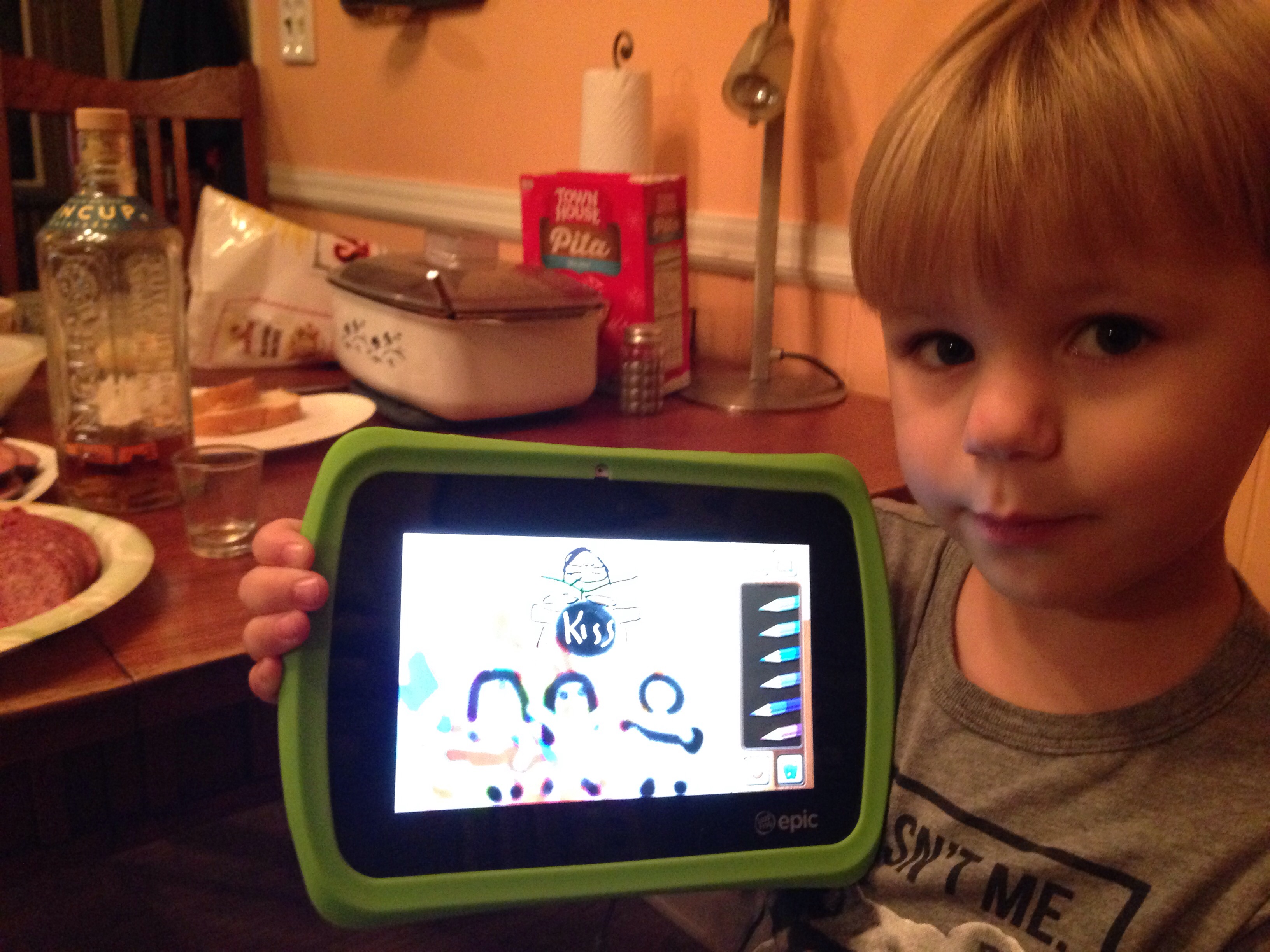
Smalls said, “An’ Jaimie, draw KISS on my Leap Pad.”
I said, “I can’t draw that!”
He said, “yes, you can.”
And like, he wasn’t wrong.
Leave a Comment | PermalinkWork Christmas Tree
Category: dribblings
The tree at work was looking drab. So while the boss was on vacation I took down the 20 year-old maroon and gold bow that goes on top cos it looked like a mass of dead flowers. I painted up some cardboard, and for the first time in EVER the library Christmas tree has a bit of whimsy.
Leave a Comment | PermalinkTags: christmas, library, whimsy
What even is my job?
Category: Uncategorized
A patron came up to me in a panic, “There’s a bee in my car!”
“Bummer.”
“Yeah, and now I can’t find it, and I’m afraid to leave, and I don’t want to put my baby in her car seat cos what if-”
“All right. I get it. Lemme grab an old paper and see what I can do.”
It was a wasp.
This job is diverse, kids.
Leave a Comment | PermalinkTags: library, work stories
Mo’ Moleskines, mo’ problems II
Category: Uncategorized
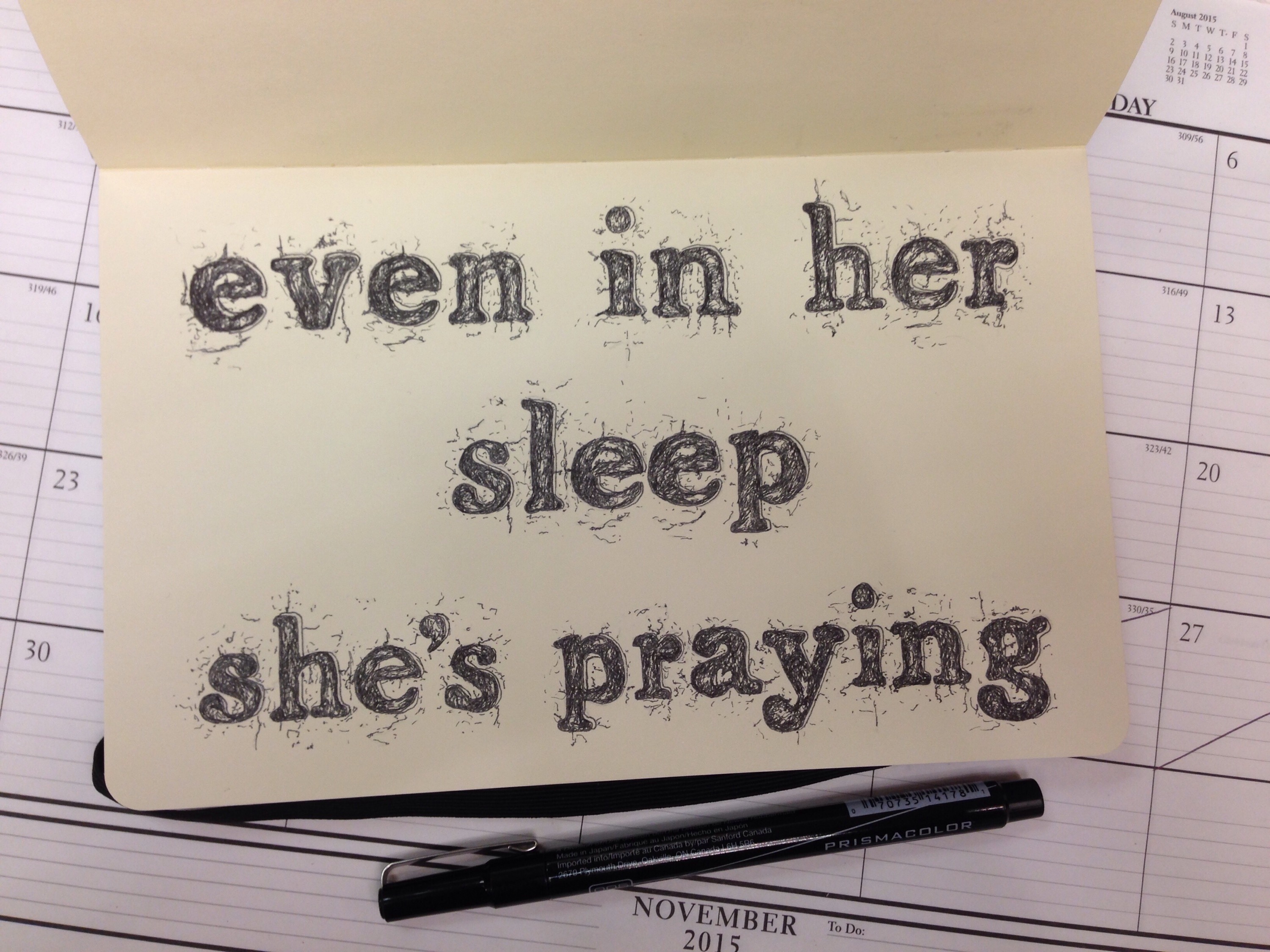
Another finished page. The font is based on the font Old Printing Press by Fontscafe.com.
My friend Regine sent me a message that started out with, “Jaimie, in my dream the other night I was praying to God about you and-”
And my first thought was, “Even in her DREAMS she’s praying! What’s that even like?”
Cos I’m a bit lousy when it comes to praying when I’M CONSCIOUS.
2 Comments | PermalinkTags: art, ink, moleskine, prismacolor
Tags: curmudgeoning, Pop music, taylor swift

